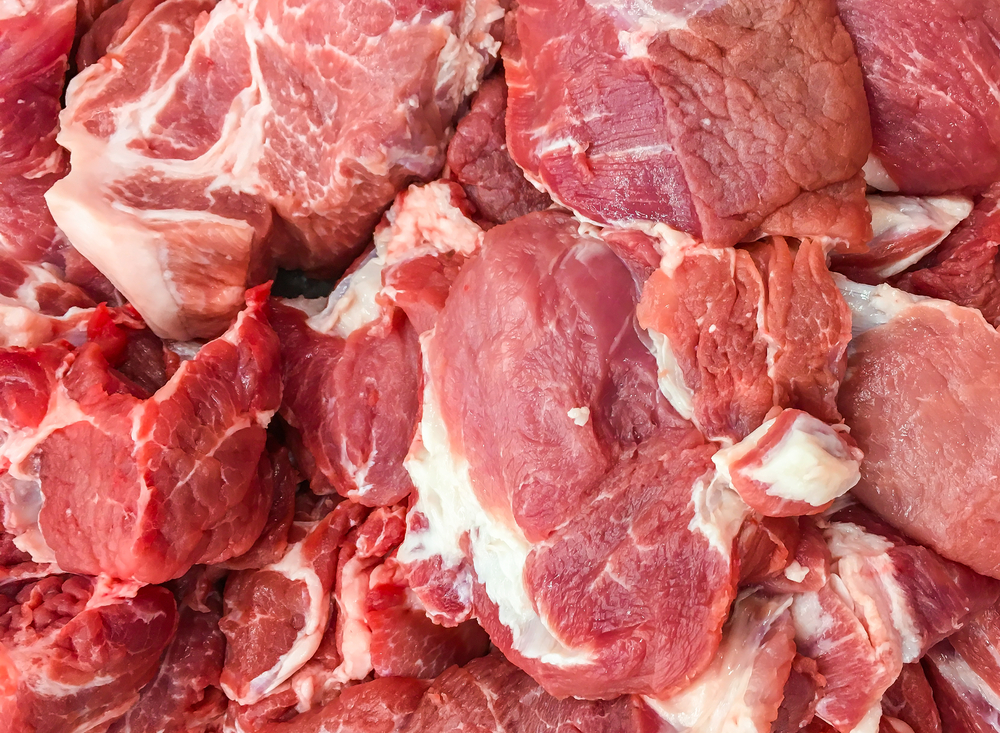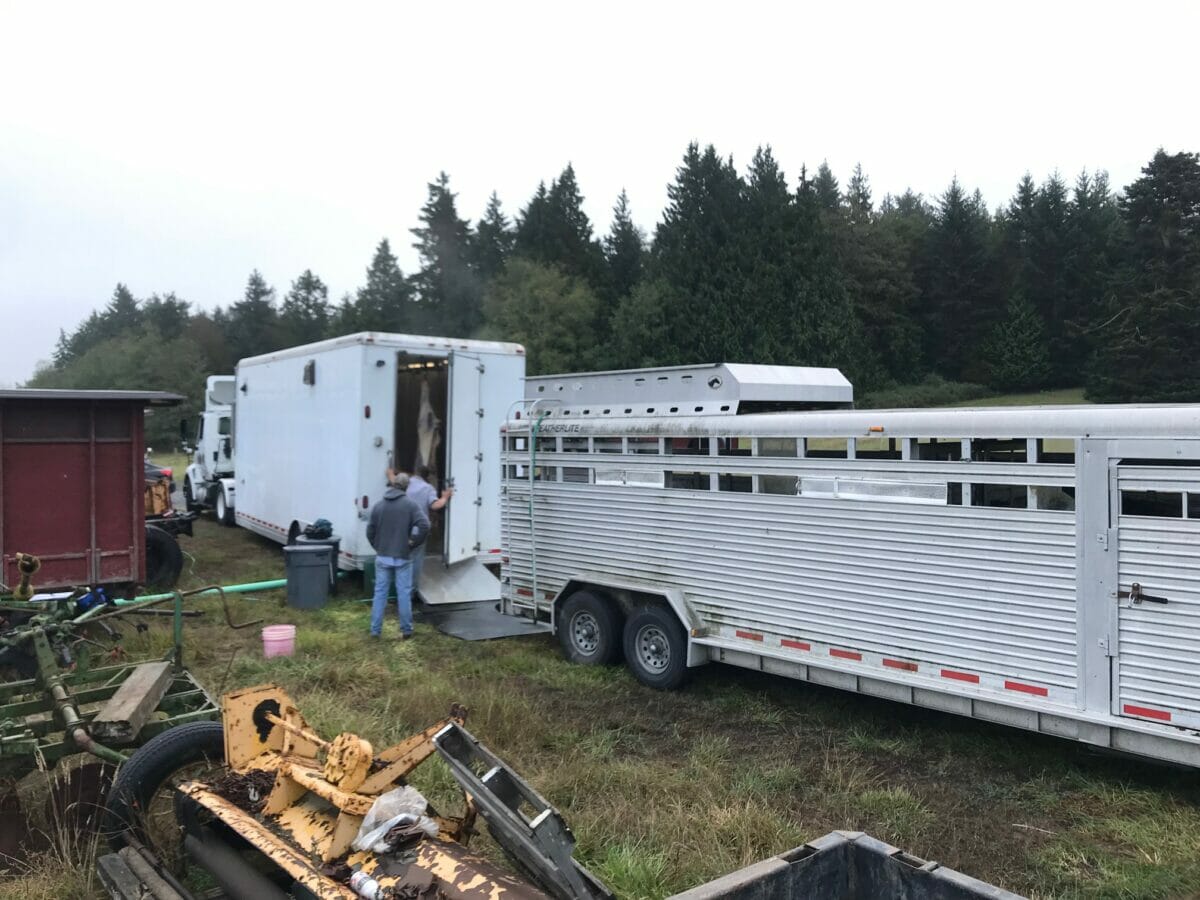A lack of processing infrastructure has long plagued livestock farmers across the United States.

It’s processing day for San Juan Island farmer Lori-Ann David. For her livestock, that means they’ll spend their morning as they typically would on the 100-acre Aurora Farms off the northern coast of Washington. And later that day, their lives will end just steps away from where they were raised thanks to the mobile slaughter unit that comes to the farm about once a month.
For the people involved in making that happen—the farmers and employees of the producer-owned Island Grown Farmers Co-Op—it is less peaceful. Coordinating the logistics behind the process requires a certain amount of patience honed by island living. It involves moving a 32-foot goose-neck trailer containing the processing unit, its two crew members and a USDA inspector, required to ride in a separate vehicle, onto a ferry (which isn’t always on time and can break down) from the mainland.
The unit then travels by road to David’s farm, where it gets hooked up to water and power for the day. The unit, which holds up to 50 carcasses depending on the size of the animal, needs to be full for the co-op to operate efficiently. This means David, who is one of only a few San Juan Island farmers with the capacity to host the truck, coordinates with smaller farmers to bring their animals to the farm for processing.
“There’s a lot of phone calls, a lot of texting [and] a lot of coordinating,” says David, who wouldn’t have it any other way. She says it fits her farming ethos of doing what’s best for the animals and the land, which receives a nutrient-rich fertilizer from the offal, or processing remains.
A lack of processing infrastructure has long plagued livestock farmers across the country, stemming from a combination of issues that differ from region to region, including consolidation, a shortage of USDA inspectors and too large a financial and work-load burden for many small processors to take on. While Island Grown was the first in the country to start using a USDA-inspected mobile processing unit in 2002, a growing number of farmers are coming together to form these kinds of co-ops. Phil Shephard, board president of Island Grown Farmer Co-Op, estimates the number of mobile processing units now in use is in the thousands.
“The advantage is those animals live their lives [on the farm], and there’s no heat stroke from traveling for miles in a trailer to a processing facility,” says Shephard, who is also the owner of Blacktail, Bass & Beef Farm on San Juan Island.
The processor boards the ferry once a week to one or two of the five islands that make up Puget Sound’s San Juan Islands and also travels across five mainland counties in the Skagit Valley. Once processed, the meat travels to the co-op’s packing facility in Bow, Washington.
This is all part of the dance that the 77-member co-op has done for almost 20 years. It began running the mobile processing unit to solve the problem of a lack of processing and market access for the island farmers. With funding from the Lopez Community Land Trust, Island Grown was able to get up and running to meet the high demand for local humanely raised meats.
Even without the logistics of ferry crossing, operating a farmer-owned co-operative is no easy task, says Shephard. “Farmers are all independent-minded [and] we want to do our own thing,” he says. “It’s a tricky business.”
Each member of the farmer-owned co-op sells their meat independently. But once the pandemic hit and restaurants closed, many of the farmers suddenly had different customers, which was when they decided to start marketing as a co-op. They are working on building a new 6,000-foot facility that will include a retail shop.

Island Grown Farmers Co-Op uses a 32-foot trailer as its processing unit. Photo courtesy of Lori Ann David.
The Bay Area Ranchers’ Cooperative (BAR-C) just had a ribbon cutting for its processing unit, which is still waiting on a few pieces of equipment, waylaid by COVID-19-related supply chain issues, before it is operational, which should be later this summer.
A lack of meat-processing facilities in California has been a problem for a long time, says BAR-C board member Duskie Estes. But in late 2019, ranchers in northern California suddenly found themselves even worse off when the only USDA-inspected processing facility for miles around decided to stop processing meat unless it was sold under its brand and bought from the farmer at a rate they set. For the small farmers who had been using the facility as a processor and then selling to their own markets, this wasn’t a viable option. The only other alternative was a 250-mile drive to the nearest facility in Eureka, which stresses the livestock and takes farmers away from their farms.
The ranchers decided to take the problem into their own hands and, in 2020, formed a co-operative, which incorporated as BAR-C last July. After raising more than $1 million through investors for the project, last November, they purchased a mobile harvesting unit in a 36-foot drop-deck trailer with a 10-foot-high ceiling, which arrived in June to the 38 members anxiously awaiting it.
While it is more financially feasible to park BAR-C’s unit instead of moving it from ranch to ranch, it still means a significant reduction in travel time for its member ranchers, most of whom farm about 10 to 20 miles away, and a smaller carbon footprint. In a survey it conducted, BAR-C estimated its 12 founding members have saved 19.6 tons of carbon, reducing their total greenhouse gas emissions by 78 percent over an eight-month period.
In the Bay Area market, buyers like Duskie Estes are eager to find sources for humane and locally raised meats. As a farm-to-table chef, Estes trained all her cooks in head-to-tail butchering and watched the producers she worked with disappear over the last ten years.
Estes, owner of Black Pig Meat Co., sources the meat for her slow-cooked bacon from Oregon because it is the nearest source of sustainable pasture-raised pigs with viable access to the USDA inspection needed for her to retail her product. But BAR-C’s processing facility could allow her to source more locally, even from her own farm.
“Now, it opens up a new business for me,” says the celebrity chef. “I think we’ll see ranching grow here.”
Other livestock producer groups, such as the Southern Wisconsin Meat Co-op, have looked to BAR-C’s fundraising efforts as a model for their own. Southern Wisconsin Meat, which incorporated this spring, is working on purchasing a mobile processing unit. Unlike most other processing co-ops, they are producer and butcher owned.
Southern Wisconsin Meat started as a 2017 grant-funded feasibility study, which showed that 85 percent of the 80 regional producers surveyed could expand their production if they had access to more slaughter and meat-processing options.
All of the current and future members practice regenerative agriculture, and the intent of the co-op is to continue that ethic in the nose-to-tail butchering of the animals. “We envision the meat co-op as the natural extension of the work done by the producer members,” says Heidi Hoff, a trained butcher who also raises Tunis/Gotland cross sheep and Alpine goats.
Hoff says that while the pandemic made the processing problem many small to medium-sized farmers face more visible to consumers, it has been an issue in southern Wisconsin for at least five to 10 years, a trend seen across the country.
The USDA has also taken note. It announced earlier this month an intention to invest $500 million in American Rescue Plan funds to expand meat and poultry processing capacity and increase competition, accessibility and fairness, according to a press release. Hoff is hopeful that this new funding could help groups such as Southern Wisconsin Meat, but she says past funding has focused on processors already in operation rather than startups.
With or without government help, the farmers in these types of co-ops are committed to them.
“This is done with so much concern and consciousness and heart not only for the animals but for the whole [supply chain],” says David. “We all take this very seriously—to grow food and get it to people in the cleanest way all around. We all know the alternative, and it’s not good—we know we make a difference.”
we have had a similar system operating in New Zealand for many years. It is a great system for small farm owners who wish to process their own animals.https://www.netherbymeats.co.nz/processing/mobile-abbattoir
We need to see many more initiatives like this. During the Depression mobile canning outfits traveled around certain states, allowing for a great deal of food to be canned, feeding hungry people.